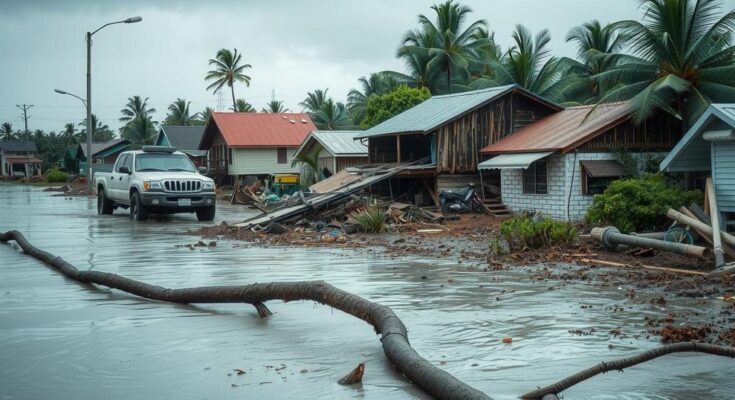Cyclone Chido has led to at least 11 fatalities in Mayotte and significant damage, prompting emergency responses. The cyclone has now moved toward Mozambique, threatening millions in two provinces. The storm’s destruction highlights the escalating impact of climate change on vulnerable populations in the region.
At least 11 individuals have been confirmed deceased due to the catastrophic impact of Cyclone Chido, which struck the French territory of Mayotte in the Indian Ocean, as reported by France’s Interior Ministry. The cyclone, described as one of the most severe to impact Mayotte in nearly a century, unleashed winds exceeding 220 kilometers per hour (136 mph) and caused substantial devastation on Saturday, particularly in Mayotte, Comoros, and Madagascar.
Emergency services are grappling with a lack of precise data on the casualty figures, with hospitals in Mayotte reporting nine patients in critical condition and 246 other individuals injured. The Prefect of Mayotte underscored the cyclone’s significant destruction, while French Interior Minister Bruno Retailleau expressed concerns that the death toll could rise further. Prime Minister François Bayrou noted that critical public infrastructure had sustained severe damage, exacerbating the challenges facing communities already living in precarious conditions.
Following its landfall in Mayotte, Cyclone Chido continued its trajectory toward northern Mozambique. Emergency officials there are cautioning that around 2.5 million people could be affected, particularly in Cabo Delgado and Nampula provinces. UNICEF noted substantial destruction in Cabo Delgado, stressing the urgent need for additional support to maintain essential services, as many residents face potential isolation from schools and hospitals for an extended period. The cyclone season typically spans from December to March in this region, with recent years showcasing an increase in the severity and frequency of cyclones, attributed to climate change.
In response to the emergencies in both Mayotte and Mozambique, France has deployed police and gendarmerie officers to assist with recovery efforts and prevent looting. Rescuers and firefighters from France and nearby Reunion are working tirelessly, while military aircraft are delivering urgent supplies. French President Emmanuel Macron and Pope Francis have both conveyed their concern for those affected by the cyclone. The repercussions of Cyclone Chido extend beyond immediate damage, as communities brace for long-term challenges, including potential health crises stemming from flooding.
Cyclone Chido’s destructive passage through Mayotte highlights ongoing vulnerabilities faced by territories in the Indian Ocean due to extreme weather events. These cyclones, especially during the seasonal period from December to March, have become increasingly severe, attributed to changing climate patterns. Cyclone Idai and Cyclone Freddy, which previously wreaked havoc in the region, are testaments to the growing humanitarian crises provoked by natural disasters in parts of southern Africa.
In summary, Cyclone Chido has resulted in significant casualties and extensive damage in Mayotte, with fears of further loss of life. As relief efforts mobilize, the situation remains critical, especially in Mozambique, where millions may face the cyclone’s ongoing repercussions. The devastating impact of these natural disasters reinforces the urgent call for enhanced climate adaptation strategies and humanitarian support for vulnerable regions.
Original Source: www.seattletimes.com




